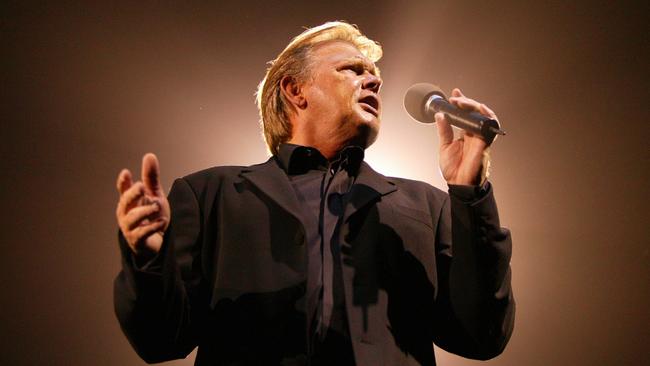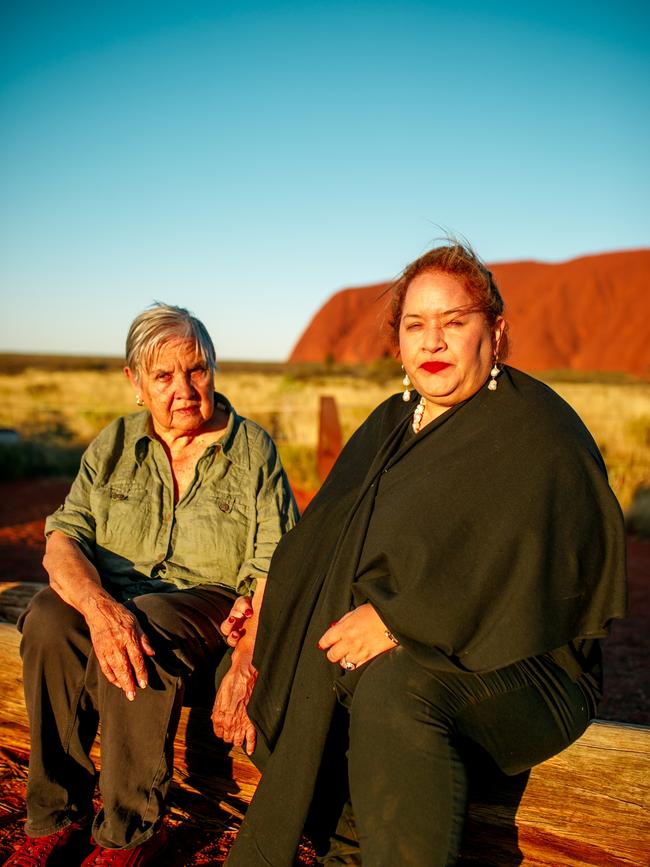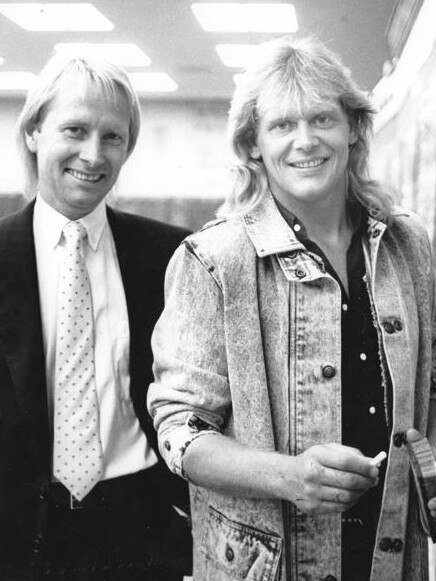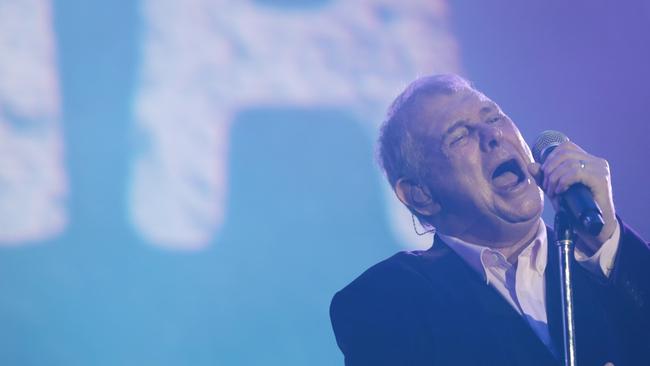One of the most popular songs in Australian history has been enlisted as a potent musical instrument in the national contest for constitutional change.
On Sunday, John Farnham announced that he would lend his titanic power ballad You’re The Voice to the Yes campaign in support of an Indigenous voice to parliament.
In a short statement, Farnham, 74, said, “This song changed my life. I can only hope that it now might help, in some small way, to change the lives of our First Nations people for the better.”
From Monday, an advertising campaign directed by award-winning filmmaker and Kaytetye man Warwick Thornton will be screened nationally.
Soundtracked by You’re The Voice, the three-minute campaign in partnership with the Uluru Dialogue – the architects of the Uluru Statement – features emotive scenes aimed at inspiring Australians to make a noise and make it clear, as Farnham sings in its indelible chorus.
Best-known for films including Samson and Delilah (2009) and Sweet Country (2017), Thornton’s short film begins in the 1980s and touches upon key moments in the nation’s history, including the Uluru hand back, Cathy Freeman’s gold medal, the 1996 gun reform, the 2008 apology and the marriage equality plebiscite.
In one of the best-kept secrets related to the upcoming referendum, the British-Australian pop singer-songwriter has been firmly in the Yes camp all year, even amid his well-publicised health concerns.

The path to secure Farnham’s support and the permission to use his much-loved anthem for the Yes vote, meanwhile, has been almost 12 months in the making.
A grassroots push began when a canny historian flicked on the television broadcast of last year’s AFL grand final just as British pop singer Robbie Williams began a cover version of Farnham’s famous song during the pre-match entertainment.
“We have the chance to turn the pages over,” sang Williams from the centre of the Melbourne Cricket Ground. “We can write what we want to write / We gotta make ends meet before we get much older…”
It’s a song millions of Australians know inside and out, but on that afternoon of September 24 2022, historian Clare Wright heard its lyrics anew in the context of the ambition of the Uluru Statement From the Heart.
Struck by inspiration, Wright gained approval from the leadership at the Uluru Dialogue, then researched how best to reach the singer.
She tapped out a “super cheeky” Instagram message that set the wheels in motion: a question was asked, and soon enough, its answer was Yes.
“Not everybody backs blackfellas on political issues publicly – but this bloke John Farnham does,” Cobble Cobble woman and Uluru Dialogue co-chair Megan Davis told The Australian. “Extraordinary.”
“He’s acutely aware of his fanbase, and the place of him and this song in this nation,” said Davis. “What vision, courage and leadership.”
A political statement
Throughout his career, Farnham has tended to steer clear of becoming involved with political or social issues during his five decades in the public eye.
Yet the last time he belted out the song in public was a political statement in itself: as the final performer at Fire Fight Australia, a televised charity concert held at Sydney’s ANZ Stadium on February 16 2020, Farnham closed his five-song set with a refreshed arrangement of You’re The Voice.
“We’ve got a little treat for you now,” the singer, then 71, told the crowd of about 70,000 people, as this much-loved pop standard and protest song was rearranged to give it a strong Indigenous flavour.
Introduced by the evocative drone of a didgeridoo, played by Allan McKenzie, this version featured guest vocals by Mitch Tambo, who took up its second verse by singing in Gamilaraay language into the chorus.
Sang Tambo: “You’re the voice, try and understand it / Make a noise and make it clear / We’re not gonna sit in silence / We’re not gonna live with fear…”
It was a gesture of supreme generosity for Farnham to reconfigure his most famous song by putting two Indigenous Australian musicians at centrestage.
Gaynor Wheatley, Farnham’s co-manager, told The Australian: “I think if John could do anything with this song, it would be to bring everyone together a little bit; just try and bring us all back to being a little bit more on the same page.”
“It’s heartbreaking to see how divisive this has become, and let’s hope this song can move people to come together,” said Wheatley.
With the benefit of hindsight, there is a clear link between that Fire Fight performance in early 2020 and his decision to speak up now for the Yes campaign in the upcoming referendum, which will be the first such vote held since 1999.
More recently, the singer’s health battles have consumed his focus.
In August last year, he underwent marathon surgery to remove a cancerous tumour from his mouth, prompting a flood of well wishes from across Australia. While recovering, he underwent a series of further surgeries as he remained in hospital for months on end.
It was only late last month that Farnham issued his first statement about the ordeal, declaring himself “the luckiest man I know right now” and that he had been confirmed as cancer-free in July.
“The song was being quoted from day one, so we really did have to engage and investigate.”
“I’m home now and I’m a very grateful and happy man,” he said in a statement on August 23. “I’m sitting here in my living room lapping up the attention from my beautiful wife, Jill, my boys Rob and James and my mini Schnauzer, Edmund.”
Twelve days later, the ARIA Hall of Famer threw his weight and his mighty song behind the Yes campaign, which began in earnest last week after Prime Minister Anthony Albanese declared the referendum date.
“The idea for a voice came from the people – and it will be decided by the people,” said Albanese on Wednesday. “Today, I announce that referendum day will be the 14th of October. On that day every Australian will have a once-in-a-generation chance to bring our country together and to change it for the better.”
Given the song’s title and its stirring effect, You’re The Voice has been a regular subject of public discussion since the Albanese government was elected last year and the prime minister pledged that a referendum would be held within his term in office.
According to Megan Davis, the famous song has been top of mind since the Uluru Statement From the Heart was first issued in 2017, which called for the establishment of a First Nations voice enshrined in the constitution.


“This is the number one question Australians have asked me since we got back from the rock, even before they asked questions about the substance of the voice,” Davis told The Australian.
“From the moment things got serious, people will even stop you in the streets and say, ‘Have you thought of approaching John Farnham?’” she said. “I have to say, it’s a relief now to be able to answer that question for people.”
“To have someone like [Farnham] take something that’s a national asset, and in such a forthright manner say, ‘Yeah, you can use this’ – despite all the misinformation and disinformation of the No campaign, and the impact that’s had on the polling – he’s stood strong and said, ‘I’m behind you’,” said Davis. “That’s what an ally is.”
According to his co-manager Gaynor Wheatley – wife of the singer’s late manager and friend, Glenn Wheatley, who died last year from Covid complications – there was a confluence of events that led to the song being used to support the Yes campaign.
“The song was being quoted from day one, so we really did have to engage and investigate,” said Wheatley. “Professor Clare Wright, who was advising the Uluru Dialogue, reached out to my son Tim, to investigate whether John would be interested.”
“That was playing in the background – and then the lyrics were written in a newspaper,” she said, though she can’t recall which publication. “I called John to get on the front foot with it, and say, ‘Look, this was not authorised, I don’t know how it happened…’ and he said, ‘I think we should do it’.”
‘It’s aligned with humanity’
Wright, the historian and author, sent a direct message to Tim Wheatley on Instagram soon after watching Robbie Williams at last year’s AFL grand final.
“Hi Tim, this is super cheeky and possibly totally inappropriate of me, but I’m trying to get a contact for John Farnham’s manager,” Wright wrote on September 27, 2022.
“It’s in the service of history. I’m a professor of history at La Trobe University. Totes legit and not stalkery. If you can help, I’d be thrilled,” she wrote. “Sorry for the imposition, if not.”
Tim Wheatley could help, and so could his mother, Gaynor.
But as it happened, Farnham was already on board with the Yes campaign, so there was no convincing required for the man otherwise known as The Voice.
“You’re the Voice is not aligned with any political party,” said Tim Wheatley in a statement. “It is aligned with humanity. It’s a song for all Australians. Always has been, always will be.”
“Win or lose this referendum, this song will forever remain on the right side of history,” said Wheatley. “Both John and my father have fiercely protected this song’s use for decades, I think for this very moment.”
Although it wasn’t written by Farnham – its four British composers are Chris Thompson, Maggie Ryder, Andy Qunta and Keith Reid – You’re The Voice has been the singer’s most identifiable work since it was issued in 1986, as the lead single for his 12th album Whispering Jack.
In the 37 years since its release, its status as a powerful song of unity has been assured.
At the 2009 fundraiser concert Sound Relief, British rock band Coldplay performed a cover version at the SCG alongside Farnham, wherein frontman Chris Martin introduced it as “the Australian national anthem”.
The only other time that You’re The Voice has been authorised for use in a political sense was for nonpartisan purposes: in 2001, it appeared in a television campaign led by the Australian Electoral Commission.
Its purpose 22 years ago was simply to encourage Australians to vote in the federal election, accompanied by a spoken statement that read: “We’re all different. We live in different places, and we all have different opinions. But on election day, every voice will be heard – and every voice counts.”
Amid the turmoil of his recent health concerns, the singer’s life has been the subject of intense public interest which crested with the release of a documentary film titled John Farnham: Finding The Voice, directed by Poppy Stockell.
In national cinema release from May 18, it earned $2.24m at the box office in its first two weekends, and went on to become the highest Australian grossing feature length documentary of all time, according to Screen Australia.
“The documentary has been fantastic and well-received – but this is actually John saying something,” said Gaynor Wheatley of Farnham’s decision to gift You’re The Voice to the Yes campaign.
The advertisement was developed by Sydney creative agency The Monkeys alongside Megan Davis and Clare Wright.
Produced by Photoplay, it is the first commercial directed by filmmaker Warwick Thornton, who said in a statement: “When asked to work on this project, I instantly said yes and it has been an honour. It has empowered me. I feel all the films I have made have been practice for this one very important and beautiful film.”
On that fateful day last September when Clare Wright flicked on the AFL grand final broadcast, she had been working on a book about the history of the Yirrkala bark petitions of 1963, which sought consultation with traditional owners prior to the government granting mining leases in North East Arnhem Land.
She had been thinking about the role of art and anthems in movements for social change, such as the iconic song that accompanied the campaign for Gough Whitlam’s election in 1972.
It’s time, so that famous song went.
Recognising the power of music when matched with the right moment, Wright saw that soon, it would be time again – but not without a nudge in the right direction, starting with her “super cheeky”, “totes legit” Instagram message.
“I think the power of the song in the context of the referendum is that it takes the act of turning up at the polling booth and voting – essentially, the act of making history – and returns it to the people,” Wright told The Australian.
“It takes it away from being something that the politicians are doing, and it returns it to the basic democratic roots that it holds: it’s in the people’s hands.”
“History is talked about as if it’s something that is inevitable, or that history ‘just happens’,” said Wright. “Well, history doesn’t just happen, and it isn’t inevitable: history is the product of the decisions that people make, and the actions that they take. We have this historic moment for our voices, our decisions, our actions to make a difference.”
A chance to turn the pages over, as it were; a chance to make a noise, and make it clear.



More Coverage
Andrew McMillen is an award-winning journalist and author based in Brisbane. Since January 2018, he has worked as national music writer at The Australian. Previously, his feature writing has been published in The New York Times, Rolling Stone and GQ. He won the feature writing category at the Queensland Clarion Awards in 2017 for a story published in The Weekend Australian Magazine, and won the freelance journalism category at the Queensland Clarion Awards from 2015–2017. In 2014, UQP published his book Talking Smack: Honest Conversations About Drugs, a collection of stories that featured 14 prominent Australian musicians.
Add your comment to this story
To join the conversation, please log in. Don't have an account? Register
Join the conversation, you are commenting as Logout